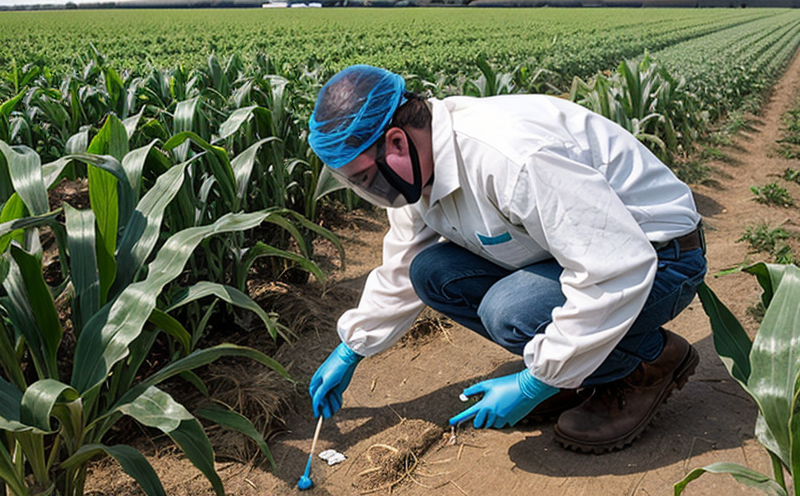Persistent Organic Pollutant (POP) Residue Testing
Understanding Persistent Organic Pollutants (POPs) is crucial in today’s world. These chemicals are a group of toxic, persistent substances that resist degradation and can be transported over long distances through air and water. They have been banned or restricted by many countries due to their harmful effects on human health and the environment. This article focuses specifically on the testing procedures for POP residues in crops.
The objective of this service is to ensure compliance with international standards such as ISO, ASTM, and IEC which set guidelines for measuring POPs content in agricultural products. By providing accurate and reliable results, we help our clients maintain their reputation as responsible and sustainable businesses within the agriculture & forestry sector.
Our team of experts uses advanced analytical techniques like GC-MS (Gas Chromatography-Mass Spectrometry), LC-MS/MS (Liquid Chromatography-Tandem Mass Spectrometry) to conduct these tests. The process involves collecting samples from various locations within farms or plantations, preparing them according to specific protocols, and then analyzing the samples using sophisticated instrumentation.
Testing for POP residues is not just about meeting legal requirements; it’s also a proactive approach towards maintaining product quality and ensuring consumer safety. It allows companies to monitor their supply chains more effectively by identifying potential issues early on before they become major problems.
The significance of this service extends beyond mere compliance checks. Regular monitoring helps in understanding the environmental impact of agricultural practices over time, guiding improvements where necessary. Additionally, it provides valuable insights into how different factors such as weather conditions or soil type influence POP accumulation levels in crops.
Our laboratory adheres to strict quality assurance measures throughout every step of the testing process—from sample collection and preparation to final interpretation and reporting. This ensures that all results are accurate and can be relied upon by decision-makers across various sectors including government bodies, research institutions, and private enterprises engaged in agriculture.
- Comprehensive Analysis: We offer a full range of analytical services designed specifically for detecting trace amounts of POPs in agricultural products.
- Standard Compliance: Our methods follow internationally recognized standards ensuring consistency and comparability with other laboratories worldwide.
- Expertise: Leveraging our extensive experience allows us to deliver precise results even when dealing with complex matrices or challenging sample types.
Why It Matters
The presence of POP residues in crops can lead to various adverse health effects ranging from reproductive disorders and developmental issues to cancer. The World Health Organization (WHO) has highlighted these compounds as priority pollutants due to their persistence, bioaccumulation potential, and toxicity.
From a regulatory perspective, many nations have implemented stringent regulations aimed at controlling the release of new POPs into the environment while phasing out existing ones. For instance, the Stockholm Convention lists numerous POPs that are subject to global bans or restrictions.
Incorporating rigorous testing protocols early in the supply chain ensures compliance with these regulatory requirements and helps protect public health. By identifying and mitigating risks associated with POP contamination, businesses can enhance their market credibility and consumer trust.
Eurolab Advantages
At Eurolab, we pride ourselves on offering unparalleled expertise in the field of agricultural testing. With a dedicated team comprising PhD-level scientists and experienced technicians, our facility boasts state-of-the-art equipment capable of handling even the most demanding analytical challenges.
We employ cutting-edge technologies such as gas chromatography-mass spectrometry (GC-MS) and liquid chromatography-tandem mass spectrometry (LC-MS/MS), which allow for highly sensitive detection limits down to parts per trillion. This level of precision is essential given the low levels at which many POPs are found in natural environments.
Our commitment to excellence doesn’t stop there; we also provide comprehensive support services tailored specifically towards our clients’ needs. Whether it’s assistance with sample preparation, method development, or interpretation of complex data sets, Eurolab is here to help every step along the way.
Environmental and Sustainability Contributions
- Reduction in Environmental Pollution: By accurately detecting POP residues in crops, we contribute towards reducing pollution levels both locally and globally. This helps preserve ecosystems for future generations.
- Promotion of Sustainable Practices: Our findings can guide farmers toward adopting more sustainable farming methods that minimize the risk of introducing harmful substances into the environment.
- Informed Decision Making: Providing clear and actionable data allows stakeholders to make informed decisions regarding production processes, thereby promoting responsible use of resources.





